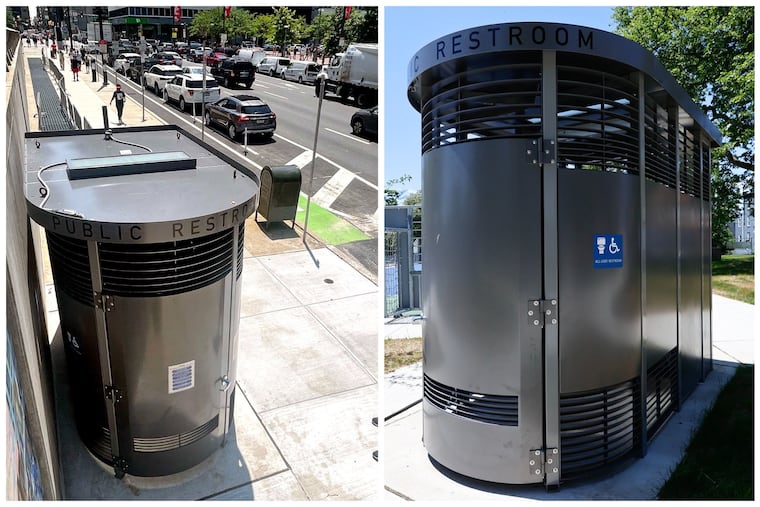Loo review No. 3: How Philly’s new public bathrooms are dooing after six months
Despite units needing to be unclogged "daily," the city's pilot project is flowing along.

Someone asked me recently why I care so much about Philly’s public bathroom pilot project, which I’ve been following since its July launch, given that our city faces so many bigger issues, like unrelenting gun violence and overcrowded schools.
Of course, I didn’t think of the answer I wanted on the spot — I said something about public surveys showing it was an important issue for Philadelphians (and they have). But as I sat with the question, the answer I ultimately came to, the reason why I care, is because if we can’t meet people’s most basic needs, how can we expect to meet the more complex ones?
That’s why I promised to continue to report on the state of the city’s public bathrooms six weeks, six months, and a year from their launch because if we can make this work, maybe there’s hope for the bigger stuff too.
» READ MORE: How a rogue Portland Loo public bathroom mysteriously ended up in a Germantown park
In hindsight, I didn’t consider that my six-month review would be on a cold day in January, but I wasn’t going to let that stop me from keeping this potty going.
Under the pilot project, six Portland Loo standalone units — which the city rebranded as Philly Phlushes — will be installed across Philly over five years at an annual cost of $656,864.
Two of the bathrooms, one at 15th and Arch Streets in Center City and another at Fotterall Square park in North Philly, opened last summer.
A turd bathroom, which the city hoped to open in Clark Park at the end of last year, was stalled and is now expected to open this summer, according to Frank A. Franklin, deputy commissioner of health with the city’s Department of Public Health, which oversees maintenance and operation of the units.
The community engagement process for determining where the fourth Phlush will go will begin this year. The remaining sites will be selected by 2026 and all units should be installed by 2027, Franklin said via email.
Missing or broken pieces
At the Phlush in Fotterall Square park, the bathroom was clean; the toilet paper, seat covers, and sanitary products were stocked; and the flush power seemed greatly improved. That being said, I didn’t actually use this bathroom because the door wouldn’t lock when I shut it. I know better than to tempt fate like that in Philly.
The naloxone case, which was fully stocked this summer, contained only one dose that was sealed in an insulated pouch with a label warning that it can’t be used if frozen. And the changing table, which was broken when I visited in August, was gone. Franklin said it was replaced but damaged again, and a new one will be installed as spring approaches.
A sign inside the restroom let me know the handwashing station was closed during winter, so I better use the hand sanitizer.
At the Phlush in Center City, the handwashing station was shut down too, but there wasn’t a sign indicating why. The door did lock though, so despite the cold, I tested it out.
Listen, I don’t think I’m ever going to get used to using a restroom on a busy Philly sidewalk while I hear people walking by talking about the Birds and where they’re going for lunch, but if you can drown that out and get into your own stream of consciousness, the awkwardness momentarily subsides.
Everything was fully stocked at the Center City unit, including naloxone, and there was a brand-new changing table too.
The bottom rear gap of the Phlush (the units are raised off the ground an inch or two) was filled with a polyurethane resin-based foam for the first time to help insulate and winterize the unit, the health department said.
Temporary signs on both Phlushes indicated they were operating under truncated hours. That’s because one of the original three public restroom specialists who clean and maintain the units is no longer with the health department. A new specialist has been hired, Franklin said, and the department expects to resume normal hours by the end of the month.
Daily unclogging
Honestly, given what a tough job it is to maintain these bathrooms, I’m impressed all three specialists aren’t pooped out. According to Franklin, due to high usage and overuse of toilet paper and seat covers, the specialists have to unclog the toilets “daily.”
“So far, there has only been one clog that required a certified plumber to address,” he said.
I did not request additional details.
The city put counters in the bathrooms to estimate how often they’re used, but Franklin held that data in because it’s a “very imprecise measurement.”
No criminal incidents have been reported, but some people have tried to stay locked in the bathrooms, according to Franklin. The public restroom specialists, who are trained in de-escalation, were able to get those folks to leave without issue, and nobody had to be forcibly removed, Franklin said.
Despite some inevitable challenges, I’m happy to report that Philly’s pilot public bathroom project still appears to be flowing along well.
Now, it’s time for some Phlush phacts. According to the health department, from October to December, the two combined units were stocked with:
562 rolls of toilet paper
770 naloxone doses
422 tampons
604 pads